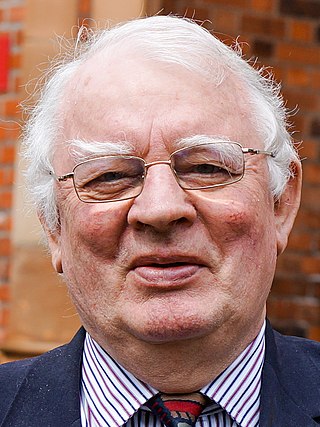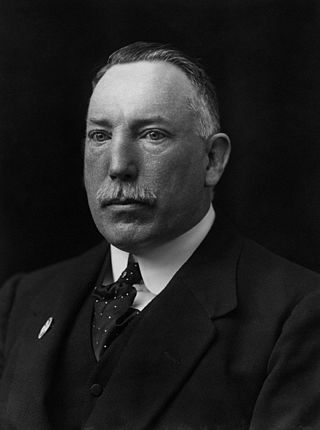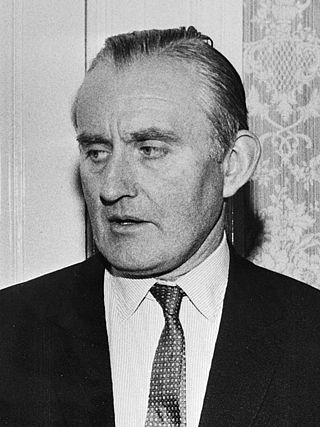
South Antrim is a parliamentary constituency in the United Kingdom House of Commons. The current MP is Paul Girvan of the Democratic Unionist Party.

The 1986 North Antrim by-election was one of the fifteen 1986 Northern Ireland by-elections held on 23 January 1986, to fill vacancies in the Parliament of the United Kingdom caused by the resignation in December 1985 of all sitting Unionist Members of Parliament (MPs). The MPs, from the Ulster Unionist Party, Democratic Unionist Party and Ulster Popular Unionist Party, did this to highlight their opposition to the Anglo-Irish Agreement. Each of their parties agreed not to contest seats previously held by the others, and each outgoing MP stood for re-election.
The 1986 Belfast East by-election was one of the fifteen 1986 Northern Ireland by-elections held on 23 January 1986, to fill vacancies in the Parliament of the United Kingdom caused by the resignation in December 1985 of all sitting Unionist Members of Parliament (MPs). The MPs, from the Ulster Unionist Party, Democratic Unionist Party and Ulster Popular Unionist Party, did this to highlight their opposition to the Anglo-Irish Agreement. Each of their parties agreed not to contest seats previously held by the others, and each outgoing MP stood for re-election.

The 1986 Upper Bann by-election was one of the fifteen 1986 Northern Ireland by-elections held on 23 January 1986, to fill vacancies in the Parliament of the United Kingdom caused by the resignation in December 1985 of all sitting Unionist Members of Parliament (MPs). The MPs, from the Ulster Unionist Party, Democratic Unionist Party and Ulster Popular Unionist Party, did this to highlight their opposition to the Anglo-Irish Agreement. Each of their parties agreed not to contest seats previously held by the others, and each outgoing MP stood for re-election.

The 1986 Strangford by-election was one of the fifteen 1986 Northern Ireland by-elections held on 23 January 1986, to fill vacancies in the Parliament of the United Kingdom caused by the resignation in December 1985 of all sitting Unionist Members of Parliament (MPs). The MPs, from the Ulster Unionist Party, Democratic Unionist Party and Ulster Popular Unionist Party, did this to highlight their opposition to the Anglo-Irish Agreement. Each of their parties agreed not to contest seats previously held by the others, and each outgoing MP stood for re-election.

The 1986 Northern Ireland by-elections were fifteen by-elections held on 23 January 1986, to fill vacancies in the Parliament of the United Kingdom caused by the resignation in December 1985 of all sitting Unionist Members of Parliament (MPs). The MPs, from the Ulster Unionist Party, Democratic Unionist Party and Ulster Popular Unionist Party, did this to highlight their opposition to the Anglo-Irish Agreement. Each of their parties agreed not to contest seats previously held by the others, and each outgoing MP stood for re-election.
The 1986 East Antrim by-election was one of the fifteen 1986 Northern Ireland by-elections held on 23 January 1986, to fill vacancies in the Parliament of the United Kingdom caused by the resignation in December 1985 of all sitting Unionist Members of Parliament (MPs). The MPs, from the Ulster Unionist Party, Democratic Unionist Party and Ulster Popular Unionist Party, did this to highlight their opposition to the Anglo-Irish Agreement. Each of their parties agreed not to contest seats previously held by the others, and each outgoing MP stood for re-election.
The 1986 South Antrim by-election was one of the fifteen 1986 Northern Ireland by-elections held on 23 January 1986, to fill vacancies in the Parliament of the United Kingdom caused by the resignation in December 1985 of all sitting Unionist Members of Parliament (MPs). The MPs, from the Ulster Unionist Party, Democratic Unionist Party and Ulster Popular Unionist Party, did this to highlight their opposition to the Anglo-Irish Agreement. Each of their parties agreed not to contest seats previously held by the others, and each outgoing MP stood for re-election.
The 1986 Belfast North by-election was one of the fifteen 1986 Northern Ireland by-elections held on 23 January 1986, to fill vacancies in the Parliament of the United Kingdom caused by the resignation in December 1985 of all sitting Unionist Members of Parliament (MPs). The MPs, from the Ulster Unionist Party, Democratic Unionist Party and Ulster Popular Unionist Party, did this to highlight their opposition to the Anglo-Irish Agreement. Each of their parties agreed not to contest seats previously held by the others, and each outgoing MP stood for re-election.
The 1986 Belfast South by-election was one of the fifteen 1986 Northern Ireland by-elections held on 23 January 1986, to fill vacancies in the Parliament of the United Kingdom caused by the resignation in December 1985 of all sitting Unionist Members of Parliament (MPs). The MPs, from the Ulster Unionist Party, Democratic Unionist Party and Ulster Popular Unionist Party, did this to highlight their opposition to the Anglo-Irish Agreement. Each of their parties agreed not to contest seats previously held by the others, and each outgoing MP stood for re-election.
The 1986 North Down by-election was one of the fifteen 1986 Northern Ireland by-elections held on 23 January 1986, to fill vacancies in the Parliament of the United Kingdom caused by the resignation in December 1985 of all sitting Unionist Members of Parliament (MPs). The MPs, from the Ulster Unionist Party, Democratic Unionist Party and Ulster Popular Unionist Party, did this to highlight their opposition to the Anglo-Irish Agreement. Each of their parties agreed not to contest seats previously held by the others, and each outgoing MP stood for re-election.
The 1986 Lagan Valley by-election was one of the fifteen 1986 Northern Ireland by-elections held on 23 January 1986, to fill vacancies in the Parliament of the United Kingdom caused by the resignation in December 1985 of all sitting Unionist Members of Parliament (MPs). The MPs, from the Ulster Unionist Party, Democratic Unionist Party and Ulster Popular Unionist Party, did this to highlight their opposition to the Anglo-Irish Agreement. Each of their parties agreed not to contest seats previously held by the others, and each outgoing MP stood for re-election.
The 1986 East Londonderry by-election was one of the fifteen 1986 Northern Ireland by-elections held on 23 January 1986, to fill vacancies in the Parliament of the United Kingdom caused by the resignation in December 1985 of all sitting Unionist Members of Parliament (MPs). The MPs, from the Ulster Unionist Party, Democratic Unionist Party and Ulster Popular Unionist Party, did this to highlight their opposition to the Anglo-Irish Agreement. Each of their parties agreed not to contest seats previously held by the others, and each outgoing MP stood for re-election.

The 1986 Fermanagh and South Tyrone by-election was one of the fifteen 1986 Northern Ireland by-elections held on 23 January 1986, to fill vacancies in the Parliament of the United Kingdom caused by the resignation in December 1985 of all sitting Unionist Members of Parliament (MPs). The MPs, from the Ulster Unionist Party, Democratic Unionist Party and Ulster Popular Unionist Party, did this to highlight their opposition to the Anglo-Irish Agreement. Each of their parties agreed not to contest seats previously held by the others, and each outgoing MP stood for re-election.

The 1922 United Kingdom general election in Northern Ireland was held on 15 November 1922. There were ten constituencies, seven single-seat constituencies with elected by FPTP and three two-seat constituencies with MPs elected by bloc voting. Only two of the constituencies had contested elections.

The 1924 United Kingdom general election in Northern Ireland was held on 29 October as part of the wider general election in the United Kingdom. There were ten constituencies, seven single-seat constituencies with elected by FPTP and three two-seat constituencies with MPs elected by bloc voting.
The 1955 United Kingdom general election in Northern Ireland was held on 26 May as part of the wider general election with 12 MPs elected in single-seat constituencies using first-past-the-post.
The 1959 United Kingdom general election in Northern Ireland was held on 8 October with 12 MPs elected in single-seat constituencies using first-past-the-post as part of the wider general election in the United Kingdom.

The 1970 United Kingdom general election in Northern Ireland was held on 31 March with 12 MPs elected in single-seat constituencies using first-past-the-post as part of the wider general election in the United Kingdom. It was the first general election held after the Representation of the People Act 1969 which reduced the voting age from 21 to 18.

The February 1974 United Kingdom general election in Northern Ireland was held on 28 February with 12 MPs elected in single-seat constituencies using first-past-the-post as part of the wider general election in the United Kingdom.









